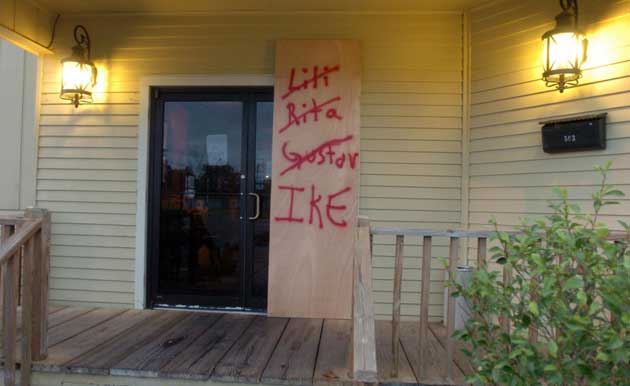Hurricane Ike devastates Texan homes and threatens US oil supplies
Huge waves surge across the Gulf of Mexico and Galveston Bay to strike Houston

Winds gusting up to 110mph sent a huge surge of water through low-lying areas of the US Gulf coast as Hurricane Ike came ashore before dawn yesterday, putting the lives of thousands of people at risk who had stayed behind to protect their homes.
At least three people were reported to have died as the storm devastated several residential areas and threatened the country's vital oil-refining industry. Although Ike was soon downgraded to a "category 1" hurricane, with winds declining to 80mph, it caused damage over an area several hundred miles wide.
Rescue teams went to the aid of dozens of families stranded on roofs yesterday morning. Some had had to use axes to break through from the attics in which they had taken refuge, only to find the flood waters threatening to drown them. Another danger was venomous snakes carried on the surge.
After crossing the Gulf of Mexico from Haiti and Cuba, where it caused untold misery, Ike hit land in Galveston, on a low-lying barrier island near Houston, at 2.10am local time. Despite being ordered to evacuate and being warned that they faced "certain death", nearly half the city's 57,000 residents opted to stay behind.
On the Bolivar Peninsula, a spit of land at the mouth of Galveston Bay, a rush of seawater left 200 people stranded and covered the only road. The coastguard carried 96 people to safety with helicopters, but had to abandon another 100 when winds grew too strong to fly safely. A wall of seawater some 20ft high came pouring through city streets, and there were numerous calls for aid from people trapped in their homes.
But Galveston's emergency services personnel, who were sheltering in the upper floors of a hotel, were powerless to help at the height of the storm, when winds of more than 100mph stove in windows and stripped the walls of the building back to the concrete.
The city's fire chief, Mike Varela, said that streets were still up to 10ft under water after the storm had passed. "The low-lying neighbourhoods are extremely flooded," he said. When asked to describe the damage, he declared it was a 10 on a scale of one to 10.
From Galveston, Ike moved on to the nearby city of Houston, headquarters of US oil majors and the Nasa space programme. The hurricane drove a wall of water up Galveston Bay into the Houston Ship Channel, the country's second-busiest port, and struck the city with such ferocity that the windows of high-rise buildings, including the tallest building in Texas, the J P Morgan Chase Tower, were shattered. Streets were left under water and at least three million people were without power.
Officials fear that as many as 100,000 homes have been inundated by the storm surge, and that millions of people across a storm front from the Mexican border through Galveston to Lake Charles in Louisiana, over 150 miles away, will be left without electricity for days or even weeks. President George Bush, whose reputation never recovered from the bungling performance of his administration when Katrina devastated New Orleans three years ago, gave an update from Washington yesterday morning saying he would move to prevent a rise in petrol prices, a sensitive issue in the presidential election.
"The storm has yet to pass and I know there are people concerned about their lives," Mr Bush said on the South Lawn of the White House. But within minutes of his brief televised appearance, he had changed into cycling clothes and was off for his weekend bike ride.
Join our commenting forum
Join thought-provoking conversations, follow other Independent readers and see their replies
Comments
Bookmark popover
Removed from bookmarks